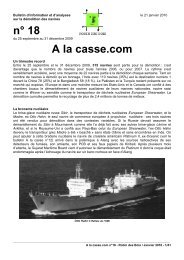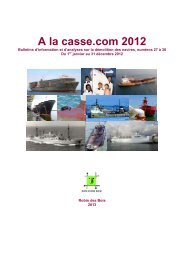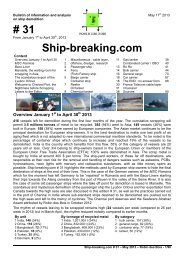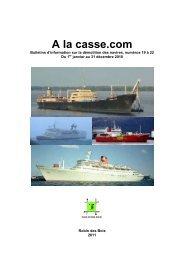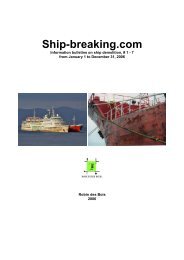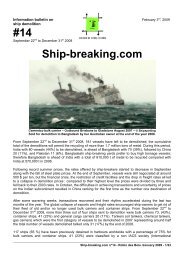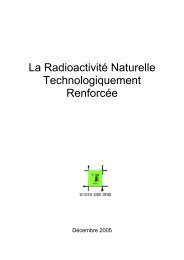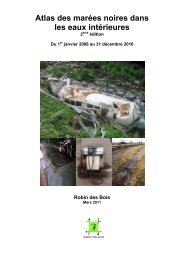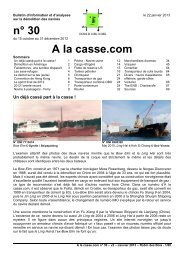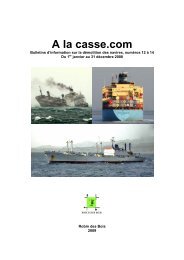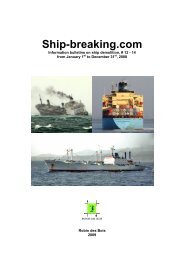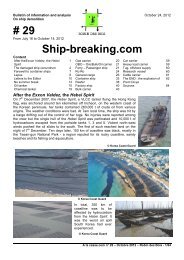Ship-breaking.com - Robin des Bois
Ship-breaking.com - Robin des Bois
Ship-breaking.com - Robin des Bois
Create successful ePaper yourself
Turn your PDF publications into a flip-book with our unique Google optimized e-Paper software.
into wrecks. Among them, two whaling vessels have been mentioned, the Tekane and the Boulenouar.<br />
Despite extensive research by a friend of “A la casse.<strong>com</strong>”, an expert in maritime genealogy, it was<br />
impossible to track down the original owners using the names of the ships at the time of their abandon.<br />
Yet, according to the international whaling ship registry held by the International Whaling Commission,<br />
two Russian units, the Skromnyy and the Solidarnyy, built in 1960, ended their career under Mauritian<br />
flag yet they are larger than the Tekane and the Boulenouar. Another wreck, the Idini, a patrol boat for<br />
the military of Mauritania was a former Russian whaling vessel. In 1979, Mauritania conditioned the<br />
delivery of fishing permits to the founding of joint venture <strong>com</strong>panies financed by foreign partners and<br />
imposing that a large portion of fishing products be brought ashore in Mauritania. But after a few years,<br />
the lack of land-based refrigeration and transformation equipment, as well as unfulfilled promises in<br />
terms of investment, led to the failure of that attempt in reappropriating halieutic resources. Being unfair<br />
players, Mauritania’s international partners had sent out fishing vessels that were exhausted and<br />
technically out-of-date. These were left behind, and during the 1980s, the ship graveyard of Nouadhibou<br />
Bay flourished.<br />
In 2001, the European Union <strong>com</strong>mitted itself to clearing this collection of wrecks. This environmental<br />
resolution was attached to an agreement with the Mauritian government authorizing a 5-year access to<br />
the Mauritian economic zone for European fleets. In 2006, when time came to renew this agreement, the<br />
European Union had not yet done anything in that respect, and the <strong>com</strong>mitment was reaffirmed. The<br />
Fishing Commissioner then underlined the fact that “this new protocol marks a change with the former<br />
ones and respects the mutual interests of both parties, as well as the environment”.<br />
In 2008, the Islamic Republic of Mauritania launched a call for « the removal of 57 wrecks from the<br />
Nouadhibou Bay ». In fact, 58 vessels which are not accessible from the coast line are listed. All the<br />
wrecks which are accessible by foot and at low tide are excluded from the tender. The tenderers have<br />
until August 17 th to file their proposals. The European Union will pay for this operation. The EU<br />
representative in Mauritania will act as a delegate for the Nouadhibou Port Authority, which will be the<br />
project owner. The EU will be de facto in charge of controlling the progress of the operation it finances.<br />
The problem is that the modalities of waste management and wreck “clearing” are extremely vague.<br />
They are based on the need to improve “safety” but none of the options are satisfactory and<br />
environmental protection only <strong>com</strong>es second. The wrecks may be submerged or regrouped in a<br />
<strong>des</strong>ignated location as near to the shore as possible. The possibility of sinking the wrecks within the<br />
framework of a European financed project in Africa is unacceptable. This would open the door to other<br />
“oceanisation” of floating wrecks abandoned for exemple in the ports of Dakar or Abidjan. Pollutants that<br />
may be technically extracted, and within the limits permitted by the Mauritanian regulations, would be<br />
stored in containers and left afterwards under the responsibility of the Nouhadibou Port Authority. It is<br />
distressing to note that the partnership offered by the EU to one of the most deprived African countries is<br />
so unambitious and re<strong>com</strong>mends negligent and derisory practices that it would not dare to promote in<br />
Brittany or in the Mediterranean Sea. To leave Mauritania deal with the dangerous waste at the end of<br />
operations is particularly inelegant. It is true that the European Union has no longer a strategy for<br />
demolishing vessels. The new Commission and the new Parliament do not care. Wel<strong>com</strong>e to pirates and<br />
offshore platforms. The wheel is turning. The sailing route towards Asia for European vessels at the end<br />
of their life will remain crowded. (See the <strong>com</strong>plete list of wrecks page 40 to 44)<br />
Bay of Nouadhibou © Berny Sèbe - Geographical Magazine.<br />
___________________________________________________________________________________________<br />
<strong>Ship</strong>-<strong>breaking</strong>.<strong>com</strong> #20 - <strong>Robin</strong> <strong>des</strong> <strong>Bois</strong> / July 2010 - 2/44



